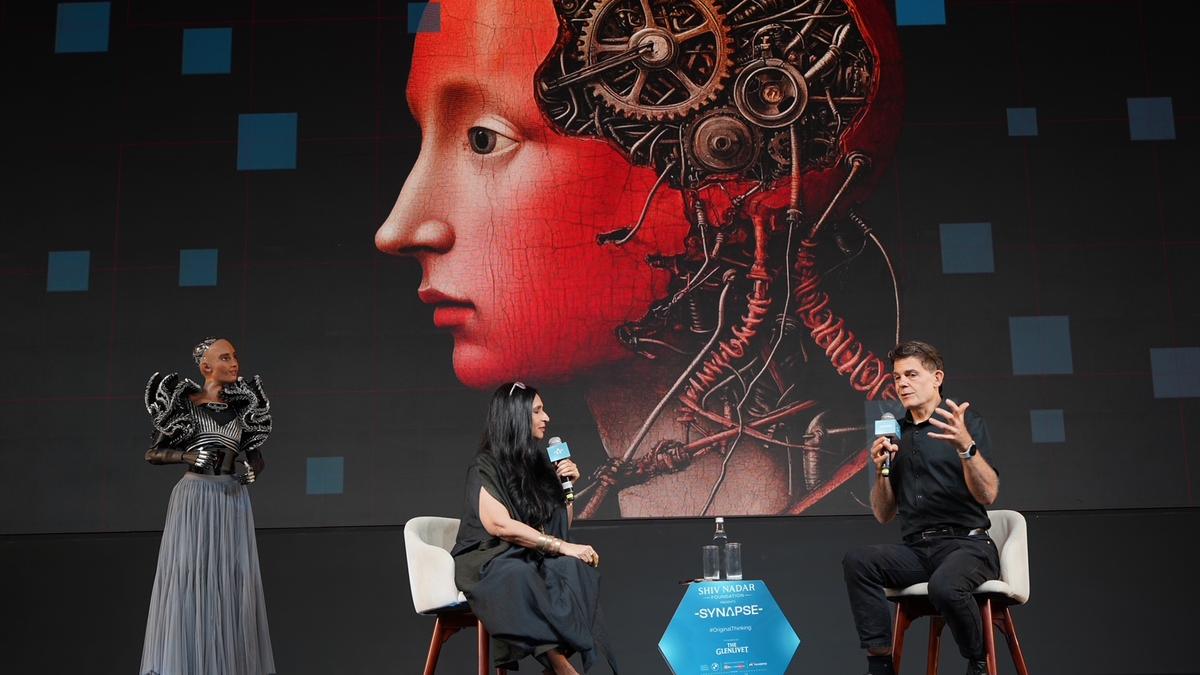
AI beyond ChatGPT: what does it mean to be human in an age of thinking machines?
The Hindu
As more users sign up for neurotech devices and agentic AI models, are we also reckoning with the risks? Synapse Conclave, a science-tech-society conference in India, debated on this and more
What are you going to do in an economy when there is going to be massive displacement due to AI? Can AI chatbots replace teachers? Do you have to worry about your brain being scanned for targeted ads? These were some of the questions that were addressed during the annual Synapse Conclave in the capital last month, where over 40 speakers, including Nobel laureates, Pulitzer Prize-winning journalists, neuroscientists and philosophers, joined AI pioneers to discuss what it means to be human in an age of thinking machines.
“The core intention was the intersection between science, tech and society,” says Shoma Chaudhury, journalist and founder-director of Synapse and the firm behind it, Lucid Lines Productions. While last year’s edition matched AI with quantum technology and biotechnologies, this year the team focused on the brain, life sciences and bio engineering. “AI and the life sciences — material sciences, climate change — they are all converging. Typically, science and tech conferences are very B2B. For instance, you will have a crypto conference or fintech conference or an AI conference. Here, we were making visible the intersection between all these sciences, its potencies and opportunities but also its ethics and impacts on society,” Chaudhury continues. For the 1,500-strong audience, which included entrepreneurs, doctors, 10 sitting High Court judges, Congress chief Rahul Gandhi, people from the ministries, architects, artists, even those from Bollywood, there was a sense of learning something entirely new and its relevance to one’s life.
Take, for instance, the debate around technology giving access to the inner workings of the brain and the need for laws to regulate this. Lawyer and AI ethicist Nita Farahany, a Synapse speaker also known for her TED talk on the right to mental privacy in the age of AI, has often highlighted how we are quickly moving into a world where what one is thinking and feeling is just as transparent and can be just as easily decoded using AI and neurotechnology. Last year, in an interview with Manoush Zomorodi, the host of TED Radio Hour from NPR, she pointed out that while “consumer neurotech devices could finally enable us to treat our brain health and wellness as seriously as we treat the rest of our physical well-being and that regular use of brain sensors could even enable us to detect the earliest stages of the most aggressive forms of brain tumours... all of this will only be possible if people can confidently share their brain data without fear that it will be misused against them”.
These concerns were reiterated by Carme Artigas when I spoke with her at Synapse 2025. Artigas has served as a co-chair of the UN’s AI Advisory Body from 2023 to 2024 and was also secretary of state for digitisation and AI in Spain. As an AI safety advocate, these days she appears as much an inhabitant of an uncertain frontier as the scientists, considering what her domain has been up against (AI safety has gone out of style, what with the U.S. and the U.K. refusing to sign on to a joint statement at Paris’ AI Action Summit emphasising safe and responsible use of the technology).
“There’s no one in the world who disagrees with the need to develop AI in an ethical way,” Artigas says. “But companies use this as an argument to say they don’t need regulation because they already have their code of ethics. Well, ethics is subjective, and changes from country to country and from CEO to CEO.” Artigas points to an EU ban on scanning brainwaves. “Immersive technology already exists, like in hospitals. The problem is when this goes out of the hospital and it becomes a consumer good… if I buy earphones from Apple, Apple has a patent already registered where they can read your mind through your earphones. Then what is the ethical use of that? Who is preventing a commercial company from maximising their benefit by using your brainwave data and selling it to a consumer?” As things stand, outside the European Union, there’s largely more regulation of household appliances than there is of AI.
These were the conversations that took centrestage at the conclave, as everyone from adman Prahlad Kakkar to filmmaker R. Balki from the audience paid attention to the speakers. While the event opened with robot Sophia — which rolled onto the stage, answered some light questions and had the crowd whipping out their phones — attendees now familiar with generative AI were more curious about what happens when we take these capabilities and plug our brains into them (or plug them into our brains)?
“People essentially want to live longer and healthier lives,” admits Elena Sergeeva, an advisor at the Foresight Institute, which isn’t just looking at brain-computer interfaces but is offering grants to leverage such brain-computer links to compete with the super-intelligent AIs of the future. Just like some of the other speakers, her work also looks into using biotech to extend lifespans. While the marriage of AI and biotech may seem new, Sergeeva points out that these are technologies that have long been intertwined. AlphaFold, first released in 2018 by Google parent Alphabet, has been used in predicting protein structures, a critical process that is of use to pharmaceutical researchers.













